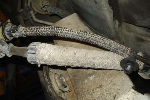knewblewkorvette
New Member
- Joined
- July 26, 2022
- Messages
- 4
- Reaction score
- 1
- Location
- IA
- City, State
- Anamosa
- Year, Model & Trim Level
- 22 Explorer Platinum 4WD
Howdy,
I'm seriously looking at ordering a 2022 Platinum Explorer and according to my nearby Ford dealership I should be able to order one sometime next week (apparently they are not taking orders currently?). The only additions I was thinking were: Star White, 600A Package, Premium Technology Package, Splash Guards, Floor Liners, and Intelligent 4WD. Currently I'm thinking of ordering it with the 3.3L Hybrid but is this the best choice? Or I could also order it with the 3.0L EcoBoost. Ford lists the 3.0L EcoBoost with 365 HP and 380 ft/lbs or torque. Ford does not specify what the 3.3L Hybrid puts out. Ford also doesn't list the fuel economy of either engine which is important to me. Please give me your impressions of what is the better motor and why. Your input will be greatly appreciated. Thanks.
I'm seriously looking at ordering a 2022 Platinum Explorer and according to my nearby Ford dealership I should be able to order one sometime next week (apparently they are not taking orders currently?). The only additions I was thinking were: Star White, 600A Package, Premium Technology Package, Splash Guards, Floor Liners, and Intelligent 4WD. Currently I'm thinking of ordering it with the 3.3L Hybrid but is this the best choice? Or I could also order it with the 3.0L EcoBoost. Ford lists the 3.0L EcoBoost with 365 HP and 380 ft/lbs or torque. Ford does not specify what the 3.3L Hybrid puts out. Ford also doesn't list the fuel economy of either engine which is important to me. Please give me your impressions of what is the better motor and why. Your input will be greatly appreciated. Thanks.











